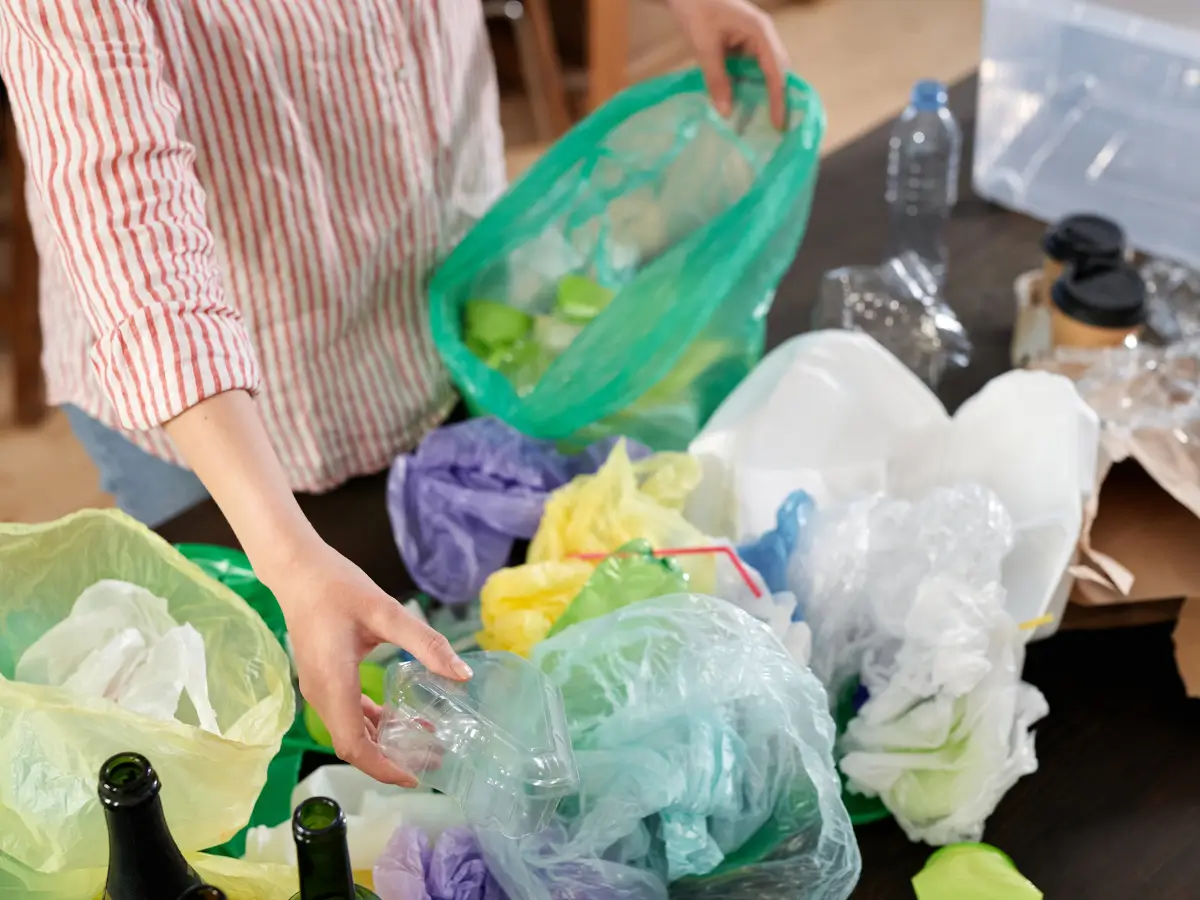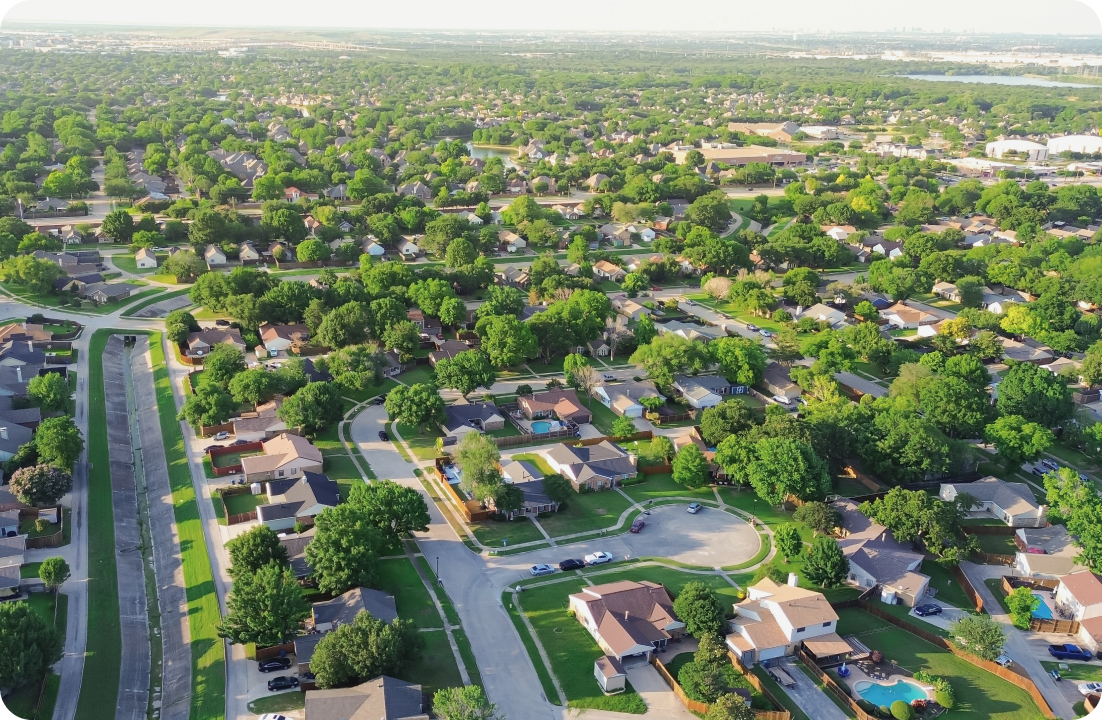All You Need to Know about Plastic Bag Recycling

Here's what you should know before you dispose of plastic bags.
Since you're a recycling pro, you probably already know that your local program doesn't accept plastic bags in curbside collection. And you may already know that plastic bag recycling is a thing you can do at most local grocery stores.
But here's where it gets confusing. Does that mean just the bags from that store? Or can you recycle more? Most drop-off bag collections accept polyethylene film. This includes high-density polyethylene (HDPE or #2 plastic) and low-density polyethylene (#4 plastic or LDPE). It's great if your bags have markings on them, but since most do not, it's good to know some general guidelines.
Accepted plastics for drop-off bins
Some plastics that can go into the store drop-off bins are
- Plastic shopping bags (from any store - remove receipts, etc.)
- Zipper-top plastic food storage bags
- Bread bags
- Some plastic liners from cereal boxes (do not include if they tear like paper)
- Produce bags
- Dry cleaning bags (remove staples, receipts, hangers)
- Plastic newspaper wrapping
- Product wrapping (such as covers a case of water bottles, etc.)
- Bubble wrap and air pillows (popped)
- Plastic shipping envelopes (remove labeling)
ALL materials should be clean and dry. If your bags are not completely clean of food residue, they will contaminate the entire batch. This includes removing all stickers, labels, and staples if any exist. Don't forget to remove receipts as well!
Plastics that need to go in the trash
Other plastics need to go into the trash. These include:
- Frozen food bags
- Cereal box liners that tear like paper
- Biodegradable bags
- Pre-washed salad bags
- Candy bar wrappers
- Chip bags
- Six-pack rings
Crinkly plastic bags such as pre-washed salad bags, chip bags, and cereal box liners that tear are made of different plastics that are less likely to be recyclable at all. So if it crinkles, do not add it to retail recycling drop-offs.
Why doesn't my local recycling accept plastic bags?
Although a small handful of communities accept plastic in curbside bins, the vast majority do not. That's because most facilities don't have the personnel and equipment they would need to process them.
Rigid plastics, like gallon milk containers, are easily processed by machine. They are carried by conveyor belts and machine sorted. But throwing plastic bags into the mix wreaks havoc on these machines. The bags bend easily and get snagged in belts. They jam machinery and need to be cleared by hand.
The extra labor required to handle these problems and the higher amount of equipment downtime makes your recycling program less profitable. That means that your government has less to spend on other programs.
Accepted bags
The few locations that do accept plastic bags in their curbside collection likely do not accept these bags and plastic overwrap loose in the bin. Check to see what the specific requirements for collection might be if your municipality accepts these bags. The common requirement is that residents put all bags into one bag and tie it at the top so recycling workers can easily pick the bag out before it goes to the sorting machine and gets tangled in the gears.
Other locations may accept bags at their facility as a drop-off item only. This likely also has the requirement of stuffing all your bags and overwrap into one bag. Just like retail drop-off locations, all thin plastic film should be clean and dry and free of stickers, staples, and receipts.
Bagging recyclables
Another recycling rule to keep in mind is to not bag your recycling. Curbside collection should be loose in the bin. Some municipalities allow overflow to be bagged in large transparent recycling bags, but you should never be adding small plastic shopping bags filled with recyclables into your bin.
Bagging items in these small bags ends up making it difficult for facilities to sort the items, and it is likely that these bags will be sent to landfill along with all the other viable recyclables inside. So make sure to avoid bagging your recyclables.
The bottom line
You can recycle plastic bags and overwrap packaging, but don't put them in your home recycling bin! You'll need to drop them off at your local grocery store or possibly at the local recycling facility if available. Check the lists above for guidelines on what is accepted and check with your drop-off location if you have any questions.
You might also like...
All You Need to Know about Plastic Bag Recycling

Here's what you should know before you dispose of plastic bags.
Since you're a recycling pro, you probably already know that your local program doesn't accept plastic bags in curbside collection. And you may already know that plastic bag recycling is a thing you can do at most local grocery stores.
But here's where it gets confusing. Does that mean just the bags from that store? Or can you recycle more? Most drop-off bag collections accept polyethylene film. This includes high-density polyethylene (HDPE or #2 plastic) and low-density polyethylene (#4 plastic or LDPE). It's great if your bags have markings on them, but since most do not, it's good to know some general guidelines.
Accepted plastics for drop-off bins
Some plastics that can go into the store drop-off bins are
- Plastic shopping bags (from any store - remove receipts, etc.)
- Zipper-top plastic food storage bags
- Bread bags
- Some plastic liners from cereal boxes (do not include if they tear like paper)
- Produce bags
- Dry cleaning bags (remove staples, receipts, hangers)
- Plastic newspaper wrapping
- Product wrapping (such as covers a case of water bottles, etc.)
- Bubble wrap and air pillows (popped)
- Plastic shipping envelopes (remove labeling)
ALL materials should be clean and dry. If your bags are not completely clean of food residue, they will contaminate the entire batch. This includes removing all stickers, labels, and staples if any exist. Don't forget to remove receipts as well!
Plastics that need to go in the trash
Other plastics need to go into the trash. These include:
- Frozen food bags
- Cereal box liners that tear like paper
- Biodegradable bags
- Pre-washed salad bags
- Candy bar wrappers
- Chip bags
- Six-pack rings
Crinkly plastic bags such as pre-washed salad bags, chip bags, and cereal box liners that tear are made of different plastics that are less likely to be recyclable at all. So if it crinkles, do not add it to retail recycling drop-offs.
Why doesn't my local recycling accept plastic bags?
Although a small handful of communities accept plastic in curbside bins, the vast majority do not. That's because most facilities don't have the personnel and equipment they would need to process them.
Rigid plastics, like gallon milk containers, are easily processed by machine. They are carried by conveyor belts and machine sorted. But throwing plastic bags into the mix wreaks havoc on these machines. The bags bend easily and get snagged in belts. They jam machinery and need to be cleared by hand.
The extra labor required to handle these problems and the higher amount of equipment downtime makes your recycling program less profitable. That means that your government has less to spend on other programs.
Accepted bags
The few locations that do accept plastic bags in their curbside collection likely do not accept these bags and plastic overwrap loose in the bin. Check to see what the specific requirements for collection might be if your municipality accepts these bags. The common requirement is that residents put all bags into one bag and tie it at the top so recycling workers can easily pick the bag out before it goes to the sorting machine and gets tangled in the gears.
Other locations may accept bags at their facility as a drop-off item only. This likely also has the requirement of stuffing all your bags and overwrap into one bag. Just like retail drop-off locations, all thin plastic film should be clean and dry and free of stickers, staples, and receipts.
Bagging recyclables
Another recycling rule to keep in mind is to not bag your recycling. Curbside collection should be loose in the bin. Some municipalities allow overflow to be bagged in large transparent recycling bags, but you should never be adding small plastic shopping bags filled with recyclables into your bin.
Bagging items in these small bags ends up making it difficult for facilities to sort the items, and it is likely that these bags will be sent to landfill along with all the other viable recyclables inside. So make sure to avoid bagging your recyclables.
The bottom line
You can recycle plastic bags and overwrap packaging, but don't put them in your home recycling bin! You'll need to drop them off at your local grocery store or possibly at the local recycling facility if available. Check the lists above for guidelines on what is accepted and check with your drop-off location if you have any questions.
You might also like...
Let's work together
We’re a proud partner to 1,700+ municipalities across North America and beyond. From local problems to larger initiatives, we’d love to have a conversation. Send us a note and we’ll be in touch as soon as possible.
